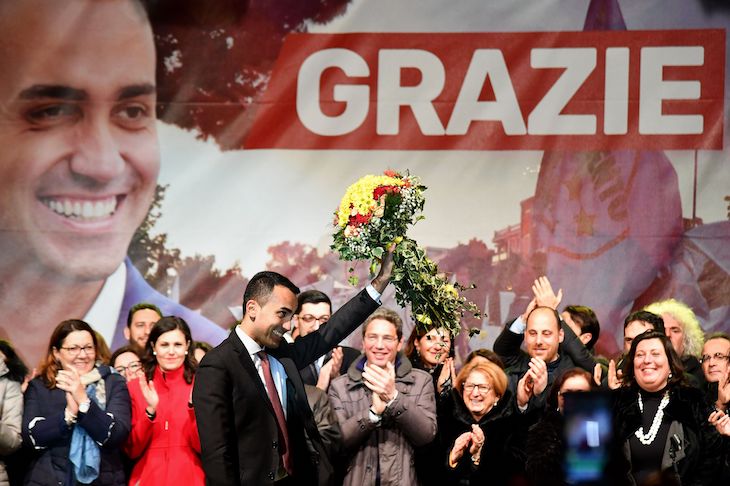Why aren’t children called Roger any more? I wondered this when reading about the sad death of Sir Roger Bannister. Coincidentally, the evening before, my young daughter had been watching The Great Escape and most of the Englishmen in it seemed to be called Roger. The only time you hear the name is in early episodes of Midsomer Murders, the ones produced before they were forced to have black people being killed in a ludicrous fashion alongside the whites, to demonstrate our commitment to equality.
It does have an awkward connotation with sex — but then it always did, Roger having been a slang word for penis right back to the 17th century. I suppose it has simply drifted out of fashion, along with common decency, emotional continence and heterosexual marriage. The UK website BabyCentre does an annual poll of the top 100 baby names for boys and Roger did not figure at all. Muhammad came first in two out of the last three years. It is a great shame: there is something steadfast and comforting about the name Roger and it has appealing European roots, deriving from the French and before that, old German, hrod — which does in fact mean steadfast. Perhaps nobody wants to be steadfast any more because it is seen as being a boring quality to possess. Ah well, I look forward to the day when parents will no longer have to agonise over what to call their offspring because everybody will be called Muhammad. Apart from the chicks, of course. But even there I have high hopes that Muhammadette will take off.
I don’t think the Italians are looking forward to the day everyone is called Muhammad. Their election results would suggest otherwise. It was, of course, a dog’s breakfast, as Italian elections tend to be (the country being no worse off as a consequence of this tradition). But the Italians voted overwhelmingly for populists and, even more so, populists who are at best sceptical of the European Union. By and large the message was this: if a party is anti-immigration, not too keen on the EU and not liberal, we will vote for it.
A caveat: the main winners, Five Star, sometimes show a vague aspiration to be liberal and they certainly at times espouse populist left-wing policies. But they have been fairly outspoken on the issue of immigration, calling for an immediate end to the arrival every week of North African Muslim migrants trafficked over from Libya and the rest of the Maghreb. The party has also previously supported a referendum on membership of the euro. The other big winners were Lega, which is even more reliably anti-immigration and anti-EU, and finally the neo-fascists reconfigured as radical conservatives, Fratelli d’Italia, which doubled its share. All three are avowedly populist parties. The pro-establishment liberals were all but wiped out.
These election results will have come as a grave shock to Justin Welby, the Archbishop of Canterbury. In his new book, Reimagining Britain, our spiritual guide and leader castigates populism: I hope the Italians feel suitably chastened. But he was far from alone. The morning after the election results came in, a writer at the Times suggested that the first consequence of the outcome would be that all Italian children would immediately die of measles.
This interesting hypothesis was predicated on Five Star’s worries about the MMR vaccine. The writer concluded: ‘This cause is dangerous, ill-informed and insular. It flies in the face of evidence, ignores progress and puts others at risk. In that sense it is a perfect reflection of populist parties.’ Well, yes, of course it is. Aside from not liking immigrants, populist parties will kill your children because they are all thick and uneducated.
You will have noticed the echo in this arrogance of the stuff which emanated from the liberal elite during our own referendum, and even more so after. The furore which greeted the Italian elections, though, has been heightened by the sudden realisation that 2017 has gone, disappeared — and with it the illusion that after the horrible, terrifying tumult of 2016, things had at last got back on track. The liberal order had re-established itself. The liberals, with the idiotic Welby among them, were immensely cheered by 2017, primarily by the victory of Emmanuel Macron in the French presidential elections, but also by the failure of Geert Wilders to make much of a dent in the Dutch elections, as well as the bloody nose afforded to Theresa May in June of that year.
But this ignores the fact that three of the leading candidates who contested the French elections were avowedly populist, even if the eventual winner was merely faux-populist. It ignores the fact that in the Dutch elections the establishment liberals were once again annihilated.
And it ignores the fact that the only unambiguously pro-Remain party in England, the Liberal Democrats, managed to capture a total of 12 seats in our own general election. It ignores Angela Merkel’s humiliations and the rise of the AfD in Germany, and the Austrian election results. So the tide had not turned, as they believed. It is still coming in and will be coming in for the foreseeable future. If you think the populist revolution which has gripped continental Europe and the US is finished, think again. It has only just started.
An opinion poll back in October suggested that 60 per cent of Italians wanted very tough restrictions on immigration into their country. That is absolutely in line with other opinion polls across Europe. It is remarkable that Europe’s liberal elite has not grasped this fact; even if Merkel has of late. The people of Europe do not want any more immigration on the scale we have seen in the past five years. That is the principal reason they are voting for populist leaders and why they will continue to do so.







Comments